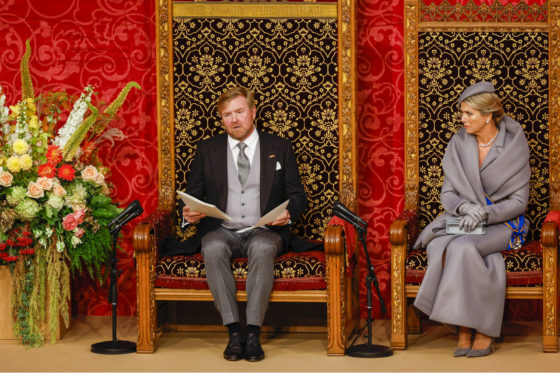King’s speech strikes sombre tone: ‘these are painful and uncertain times’


The Netherlands is going through a time of ‘paradox and uncertainty’ that has shaken people’s trust in the government’s ability to solve society’s problems, king Willem-Alexander acknowledged in his annual speech from the throne.
The sombre tone of his speech, the centrepiece of the state opening of parliament, reflected the multiple challenges the cabinet faces: soaring energy bills, rising inflation, the war in Ukraine and farmers’ protests against plans to reduce nitrogen compound emissions.
The royal carriage carrying the king, queen Maxima and princess Amalia, attending for the first time since turning 18 in December, was greeted with a mix of cheers and boos on its way from Noordeinde palace to the Koninklijke Schouwburg Theatre. Some protesters held up inverted flags, which has become the symbol of the farmers’ protests.
‘It is a paradox that in a period of economic growth and low unemployment, households face a cost-of-living crisis and poverty is on the rise,’ the king said in his speech, which was delivered in the theatre while the parliament complex is being renovated.
‘It is a paradox that people in a free country like ours feel unable to express their opinions for fear of hostile reactions or even threats.
‘And it is concerning that, in a mature democracy such as ours, people are losing faith in the problem-solving power of government and politics.’
Read the entire speech from the throne in English on the Dutch government’s website
Groningen and benefits scandal
The king also said the cabinet felt an ‘absolute duty’ to do justice to people living in Groningen whose homes had been damaged by gas extraction and the families whose lives had been damaged by the childcare benefits scandal that brought down the last government.
‘It remains a painful and shameful fact that so many individuals and families face serious problems as a result of mistakes and negligence on the part of the authorities,’ he said.
The speech was revised in the hours before it was delivered to include a passage about plans to cap energy prices, after an agreement with utility companies was finalised on Monday night.
The king said the government would present an ‘unprecedentedly strong package of measures’ worth over €18 billion to tackle the cost of living crisis, which is expected to include a limited cap on energy bills based on an average household’s consumption.
‘It is a painful reality that more and more people in the Netherlands are struggling to pay their rent, grocery bills, health insurance and energy bills,’ the king said.
Threat to peace
He said ‘Russia’s brutal aggression against Ukraine’ threatened the peaceful society Netherlands had built since the Second World War and had reinforced the need for unity with the European Union, Nato and the United Nations.
The king also outlined long-term plans to tackle inequality by raising the minimum wage and benefits while raising taxes on profits and wealth, while higher taxes on gas and oil companies will go towards paying low earners’ energy bills.
But he said the cabinet was still committed to its plans to switch from fossil fuels to ‘clean energy’ and reduce CO2 emissions, as well as creating a ‘new role for nuclear energy. ‘The future agenda cannot be postponed,’ he said.
The 50% reduction in nitrogen emissions, which has been the focus of the farmers’ protests, and a transition to sustainable farming is inevitable, the king emphasised, but he acknowledged this is ‘understandably an emotive subject for farmers, who fear for the future of the family businesses’. They needed to be given viable options such as new working methods, technology, relocation, while in some cases ‘a buy- outarrangement will be the best option.’
More subsidies will be available for homeowners to make their houses more energy efficient, plans for wind and other renewable energy will be accelerated and the government is aiming to cut off Russian gas supplies completely by the end of the year.
Abolition of slavery
With the 150th anniversary of the abolition of slavery approaching, the king also gave the strongest hint yet that the government was ready to offer apologies for the wrongs of the colonial past.
‘If we want a society where there is no place for racism and discrimination, where everyone feels heard and appreciated, we must openly reflect on the less pleasant chapters in our history,’ he said.
‘The government has previously spoken out about the actions of the Dutch authorities during the persecution of the Jews, and about the extreme violence on the part of the Netherlands during the period of decolonisation in Indonesia
As we approach next year’s 150th anniversary of the abolition of slavery, we need to acknowledge this part of our history, too.’
Thank you for donating to DutchNews.nl.
We could not provide the Dutch News service, and keep it free of charge, without the generous support of our readers. Your donations allow us to report on issues you tell us matter, and provide you with a summary of the most important Dutch news each day.
Make a donation